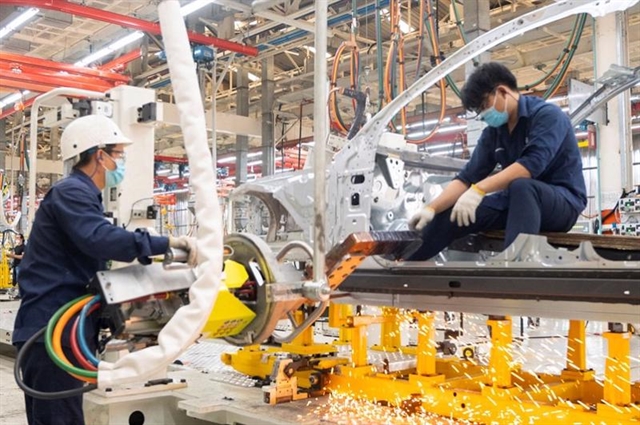While the total number of new business continued to rise, new export orders decreased for the second month running.

HÀ NỘI — The S&P Global Vietnam Manufacturing Purchasing Managers' Index (PMI) dipped below the 50.0 no-change mark for the first time in three months during December 2024, to be at 49.8 from 50.8 in November.
Under a report released on Thursday, S&P Global said the reading signalled a fractional deterioration in overall business conditions at the end of the year.
“The worsening in the health of the sector was recorded in spite of increases in output and new orders, as firms scaled back their employment and stocks of purchases,” the report states.
Although both output and new orders increased in December, rates of expansion were only slight and the weakest in the respective three-month growth sequences. Some firms signalled demand improvements, while others reported that market conditions had softened.
While the total number of new businesses continued to rise, new export orders decreased for the second month running and at a solid pace.
Concerns about global market instability and uncertainty caused a drop in confidence regarding the year-ahead outlook for production. Sentiment fell markedly in December and was the lowest since May 2023. However, hopes for increases in new orders, an improvement in economic conditions and the resolution of some of the conflicts around the world, meant that firms were on balance optimistic that output will expand.
According to the report, expected rises in output in the coming months led to a renewed increase in purchasing activity, with the rate of expansion the fastest in four months. Firms remained reluctant to hold excess inventories, however, and reduced stocks of purchases accordingly. Stocks of finished goods were also down.
Manufacturers reduced employment for the third successive month at the end of the year amid muted growth of new orders. Although modest, the pace of job cuts was the sharpest since August.
The continued scaling back of employment at a time when new orders were expanding (albeit slightly), meant that backlogs of work accumulated again in December, extending the current sequence of rising outstanding business to seven months. That said, the latest increase was only marginal and the weakest in this sequence.
Inflationary pressures picked up in December, with both input costs and output prices rising at sharper rates than in November.
Material shortages and exchange rate fluctuations contributed to higher input costs, according to the panel, with oil and metals among the items with noted price increases.
In turn, companies increased their output prices for the eighth month in a row, and at a solid pace that was the fastest since July. The latest rise was also stronger than the series average.
Finally, suppliers' delivery times lengthened for the fourth month running, with firms often noting slow traffic conditions. The lengthening of lead times was only modest, however, and the least pronounced in the current period of deteriorating vendor performance.
Economics Director at S&P Global Market Intelligence, Andrew Harker, said: "It was a subdued end to the year for the Vietnamese manufacturing sector as growth of output and new orders slowed.
"Global market uncertainty also acted to depress confidence, which fell to the lowest in more than a year-and-a-half. This may in part reflect the uncertain picture with regards to plans by the incoming US administration around tariffs. Further announcements on this in the New Year will help to provide clarity on any potential impacts on Vietnamese manufacturers." — VNS





